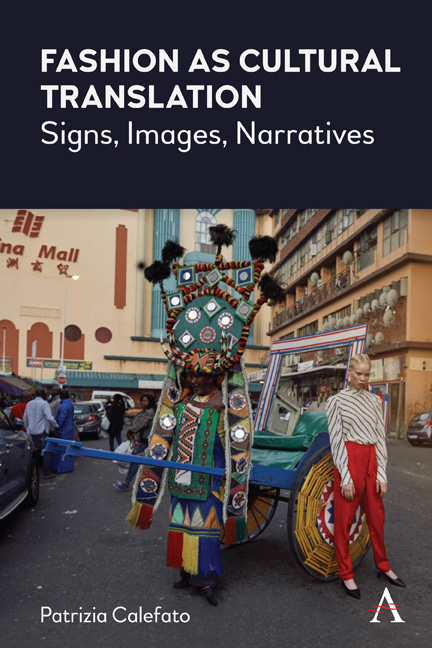Book contents
- Frontmatter
- Contents
- Introduction: Fashion as Cultural Translation in the Hyperconnected World
- Supplement to the Introduction: Fashion, the Hyperconnected World and Coronavirus
- 1 Time
- 2 Spaces
- 3 Fashion as Cultural Tradition: Italian Style
- 4 Fashion as Cultural Translation
- 5 Clothed Bodies
- 6 The Body as Text
- 7 Humans and Beyond
- 8 Fashion and the ‘Second Nature’
- 9 Fashion, Communication and Converging Media
- 10 Fashion Narratives in Visual Culture
- Conclusions: Fashion as an Idea about the Future
- References
- Index
6 - The Body as Text
Published online by Cambridge University Press: 18 February 2021
- Frontmatter
- Contents
- Introduction: Fashion as Cultural Translation in the Hyperconnected World
- Supplement to the Introduction: Fashion, the Hyperconnected World and Coronavirus
- 1 Time
- 2 Spaces
- 3 Fashion as Cultural Tradition: Italian Style
- 4 Fashion as Cultural Translation
- 5 Clothed Bodies
- 6 The Body as Text
- 7 Humans and Beyond
- 8 Fashion and the ‘Second Nature’
- 9 Fashion, Communication and Converging Media
- 10 Fashion Narratives in Visual Culture
- Conclusions: Fashion as an Idea about the Future
- References
- Index
Summary
Language and Fashion: From the Name of God to the Power of Brands
What signs does memory use to establish its bustles and mark its voids? If life is a state of mind, as the voice-over observes at the end of the film Being There, what are the systems that enable us to establish connections between our individual states of mind, to deliver them in the future or rescue them back from the past? Through what mechanisms do fashions, tastes, daily cultural objects and places remain in time and oppose their own decay, understood not only as physical wear but also semiotic?
The sciences of signs tell us that this role is fulfilled by what Russian semiotician Jurij Lotman identified as ‘primary modelling systems’ – the first of which is language. As a particular form of language, specific writing plays a vital role. Writing can be the fabric and the lived text of memory, of its strengths and shortcomings, of its repetitions and its creations. Lotman writes:
Along the entire course of cultural history, unknown artifacts of the past are constantly being found, discovered, or unearthed either from the ground or from the dust of a library. (Lotman 2019, 135).
In our epoch, objects, places and bodies are writing surfaces – they are covered in texts, names and brands. These signs have developed an increasingly important role in the modes of production of our times. The function of writing is no longer that of marking objects with ‘distinctive’ features, namely, to detach them from and oppose them to other objects, for example, like a sign indicating the name of a road or a label indicating the contents of a jar. Writing has developed a much more ambitious task: to embody a vision, a project, a tale. As the figure of writing, ‘in name appears the essential law of language’ (Benjamin 1996, 65).
The nineteenth-century Jewish mysticism scholar Gershom Scholem (1996) dedicated a central part of his research to the role of the name of God in Kabbalistic culture. This is an essential role if we accept the mystical hypothesis that the Torah, the sacred text of the Jewish tradition, might be – as Scholem explains – the expression of the infinite might of God, concentrated in his name.
- Type
- Chapter
- Information
- Fashion as Cultural TranslationSigns, Images, Narratives, pp. 55 - 66Publisher: Anthem PressPrint publication year: 2021



